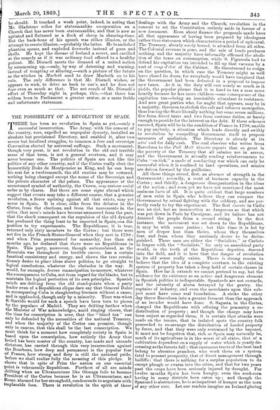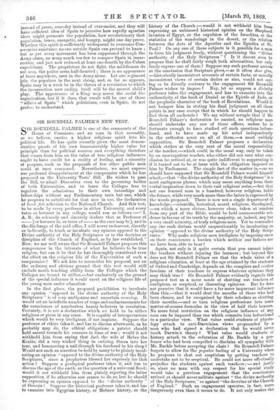THE POSSIBILITY OF A REVOLUTION IN SPAIN.
THERE has been no revolution in Spain as yet,—only a successful insurrection. The Army, with the consent of the country, rose, expelled an unpopular dynasty, installed an absolute but provisional Directory, and enabled it, after two severe but localized struggles, to summon a free and sovereign Convention elected by universal suffrage. Such a movement, -though very great, is not revolution in the old and terrible sense of that term, is not a general overturn, and it may never become one. The politics of Spain are not like the politics of any other country, and if the Cortes really elect the housewifely Duke de Montpensier as King, and he can keep his seat for a twelvemonth, the old routine may be restored, nothing being changed except the name of the Sovereign and the private character of the palace. The appearance of the accustomed symbol of authority, the Crown, may restore social order as by charm. But there are some signs abroad which suggest that events may take a different course, that a genuine revolution, a fierce uprising against all that exists, may yet occur in Spain. It is clear, alike from the debates in the Oortes, from the elections, and from the movements in the cities, that men's minds have become unmoored from the past, that the shock consequent on the expulsion of the old dynasty has produced the thing least to be expected in Spain,—a disposition to try experiments. The Republicans, it is true, returned only sixty members to the Cortes ; but there were -not five in the French States-General when they met in 1798 ; and when Prim pronounced for monarchy, less than six months ago, he declared that there were no Republicans in Spain. This party, moreover, though outnumbered, as the Mountain was throughout its terrible career, has a certain fanatical consistency and energy, and shows the true revolutionary desire to place ideas above policies, to go straight to logical conclusions, whatever the obstacles in the way. It would, for example, decree emancipation to-morrow, whatever the consequences to Cuba, not from regard for the blacks, but to maintain the logical perfection of its own principles. Spanish minds are drifting from the old stand-points when a party leader even of a Republican clique dare say that General Duke in reconquering Cuba is slaughtering freemen without a cause, and is applauded, though only by a minority. Time was when S. Garrido would for such a speech have been torn to pieces by the populace of Madrid. They are drifting farther when the Minister of War acknowledges, amid ringing cheers, that the time for conscription is over, that the " blood tax " can only be defended by the necessities of the national Treasury, and when the majority of the Cortes can promise, though only in caucus, that this shall be the last conscription. We must think for a moment how completely society in Spain is based upon the conscription, how entirely the Army thus levied has been master of the country, has made and unmade dictators, has carried through this very insurrection against the Bourbons, how deep and permanent is the popular fear of France, how strong and fiery is still the national pride, before we shall realize fully the meaning of this pledge. It shows that in spite of Prim the nation on one essential point is vehemently Republican. Furthest of all are minds -drifting when an Ultramontane like Olozaga fails to become President of the Cortes because he is an Ultramontane, and
• !tome, alarmed for her stronghold, condescends to negotiate with implacable foes. There is revolution in the spirit of these dealings with the Army and the Church; revolution in the consent to set the Constitution entirely aside in favour of a new document. Even about finance the proposals made have all that appearance of having been prepared by ideologues rather than statesmen which characterizes a period of upheaval. The Treasury, already sorely bested, is attacked from all sides. The Colonial revenue is gone, and the sale of lands produces nothing, and the majority have informally affirmed the abolition of the taxes on consumption, while S. Figuerola had to defend his capitation tax intended to fill up that vacuum by a sort of coup (taw of the Cabinet. He threatenend to resign on the question, in which case the Treasury might as well have closed its doors, for everybody would have imagined that the Government had been defeated in a proposal to impose new taxes. As it is, the duty will cost nearly as much as it yields, the popular phrase that it is hard to tax a man more heavily because he has more children—one consequence of the capitation tax—being an irresistible stimulant to resistance. And now great parties who, for aught that appears, may be in a majority, threaten to abolish the salt and tobacco monopolies, thus leaving the State literally nothing but some seven millions, five from direct taxes and two from customs duties, or barely enough to provide for the interest on the debt. If these schemes succeed, Spain will be in the condition of France in 1798, unable to pay anybody, a situation which leads directly and swiftly to revolution by compelling Government itself to propose measures of spoliation. The Directory is already at its wits' end for daily cash. The cool observer who writes from Barcelona to the Pall Mall Gazette reports that so great is the poverty of the Treasury that all salaries are in arrear, and the Government is actually sending reinforcements to Cuba "on tick," a mode of conducting war which can only be successful when it is confined to land operations, and armies are driven forward by the guillotine.
All these things reveal, first, an absence of strength in the Government ; secondly, a want of business capacity in the Cortes ; and thirdly, a dangerous disorganization in the ideas of the nation ; and even yet we have not mentioned the most ominous facts of all. It is quite evident that large numbers of men exist in Spain who believe they can conquer the Government by actual fighting with the soldiery, and are perfectly ready to try the experiment. The first e'meute in Cadiz was no riot, but an insurrection as dangerous as that which was put down in Paris by Cavaignac, and its failure has not deterred the people from a second rising. In the first instance, the movement was set down to the Republicans, it may be with some justice ; but this time it is led by men of deeper hue than theirs, whom they themselves fear, and from whom they anxiously desire to be distin guished. These men are either the " Socialists," or Oarlike in league with the "Socialists," for only an anarchical party would, in the teeth of the Republican deputies, descend into the field, and it is here that the danger of revolution in its old sense really exists. There is strong reason to believe that the idea of a complete overturn in the existing system of property has taken a deep hold of certain classes in Spain. How far it extends we cannot pretend to say, but the evidence for its existence as an active and dangerous element in Spanish politics is indisputable. Spaniards are not cowards, and the intensity of alarm betrayed by the gentry, the captains of industry, and even the merchants upon this sub ject must have sonic real foundation. A strike the other day threw Barcelona into a greater ferment than the approach of an invader would have done. S. Sagasta, in the Cortes, charged the Republicans with offering the peasantry a redistribution of property ; and though the charge may have been unjust as regarded them, it is certain that attacks were made on the tenure, that in isolated spots the country folk proceeded to re-arrange the distribution of landed property by force, and that they were only restrained by the bayonet, It must not be forgotten that, rich as Spain may naturally be, much of its agriculture is in the worst of all states, that of a cultivation dependent on a supply of water which is yearly de creasing as the forests fall ; that enormous tracts of the best land belong to absentee grandees, who work them on a system fatal to peasant prosperity, that of direct management through bailiffs ; that there is nothing for a surplus population to do except plough or swarm into the cities, and that for two years past the crops have been seriously injured by drought. For twelve months Spain has been hungry, even the seed-corn having in many districts been eaten up ; and though the Spaniard is abstemious, he is as impatient of hunger as the matt of any other race. Let our readers imagine an Ireland glaring instead of green, over-dry instead of over-moist, and they will have sufficient idea of Spain to perceive how rapidly agrarian • ideas might permeate the population, how revolutionary that population, brave, energetic, and hungry, might one day prove. Whether this spirit is sufficiently widespread to overcome Conservative resistance no one outside Spain can pretend to know ; but as yet every movement has been suppressed through the Army alone, an army much too few to conquer Spain in insurrection, and just now reduced at least one-fourth by the Cuban expeditions. The proprietors do not fight, the middlemen do not arm, the police seem half-hearted ; there is no appearance of force anywhere, save in the Army alone. Let one regiment join the populace in the next rising, and, so far as appears, Spain may in a week be in the throes of a revolution to which the insurrection now ending itself will be the merest child's play. The appearance of a King may arrest the social disorganization, but if it does, that result will be one of those "affairs of Spain" which politicians, even in Spain, do not profess to understand.



































 Previous page
Previous page